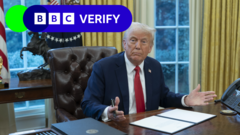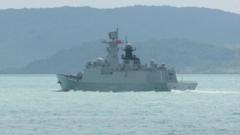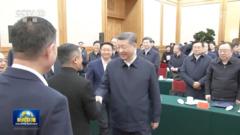The recent imposition of tariffs by the Trump administration has raised concerns about potential global economic repercussions, particularly as retaliatory measures from China signal the onset of a trade war that could affect North American industries and international investments.
Escalating Tensions: Trump's Trade Strategy and Its Implications

Escalating Tensions: Trump's Trade Strategy and Its Implications
A look into the initial stages of Trump's trade war, focusing on tariffs imposed on China and the US's relations with Canada and Mexico.
The recent announcement by President Donald Trump to impose a 10% tariff on all imports from China marks a significant escalation in his administration's trade strategy, igniting fears of a full-blown trade war. While tariffs on trading partners Canada and Mexico have been postponed for 30 days, the immediate move against China demonstrates a serious commitment to reshaping international trade dynamics.
Trump's administration has already levied significant tariffs against China during his first term. However, the new blanket tariffs, targeting an expansive range of goods—from electronics to clothing—signal a more aggressive approach. In response, China has prepared retaliatory measures, including tariffs on US imports like energy and automobiles, initiating a potentially harmful tit-for-tat exchange.
Economic historians warn that such actions often create momentum that spirals out of control, leading to widespread economic repercussions. While Trump has justified tariffs on various grounds—including increasing tax revenues and protecting American manufacturing—his approach demonstrates a reliance on pressure tactics to influence global trade policies.
His methods have produced mixed results; for instance, after threatening Colombia with tariffs related to immigration policies, President Trump escalated similar tactics against Mexico and Canada, leading to brief negotiations but uncertain commitments on border security measures. Economists question the sustainability of this combative strategy and worry it may force Trump to enact more tariffs if nations resist compliance, thus escalating tensions further.
Compounding these concerns is the potential impact on cross-border supply chains, particularly in the automotive sector, which heavily relies on seamless trade across North America. Analysts warn that the uncertainty surrounding these tariffs could deter investment decisions, stifling productivity and leading to wage stagnation for American workers.
Moreover, the unpredictability of Trump’s tariff diplomacy poses risks on a global scale. Multinationals that shifted their manufacturing bases from China to countries like Vietnam to escape tariffs may rethink their strategies if Trump extends his tariff threats to these nations. The pervasive uncertainty could dampen investment intentions and confidence in the global market, further complicating the economic landscape.
In conclusion, while the immediate consequences of Trump's tariffs are being measured, the broader implications for the global economy and international relations may unfold in unforeseen ways, leaving industries and governments grappling with the fallout of this trade war. As countries react to the evolving circumstances, the long-term effects of this aggressive trade policy remain to be seen, leaving much at stake in the global economic arena.





















